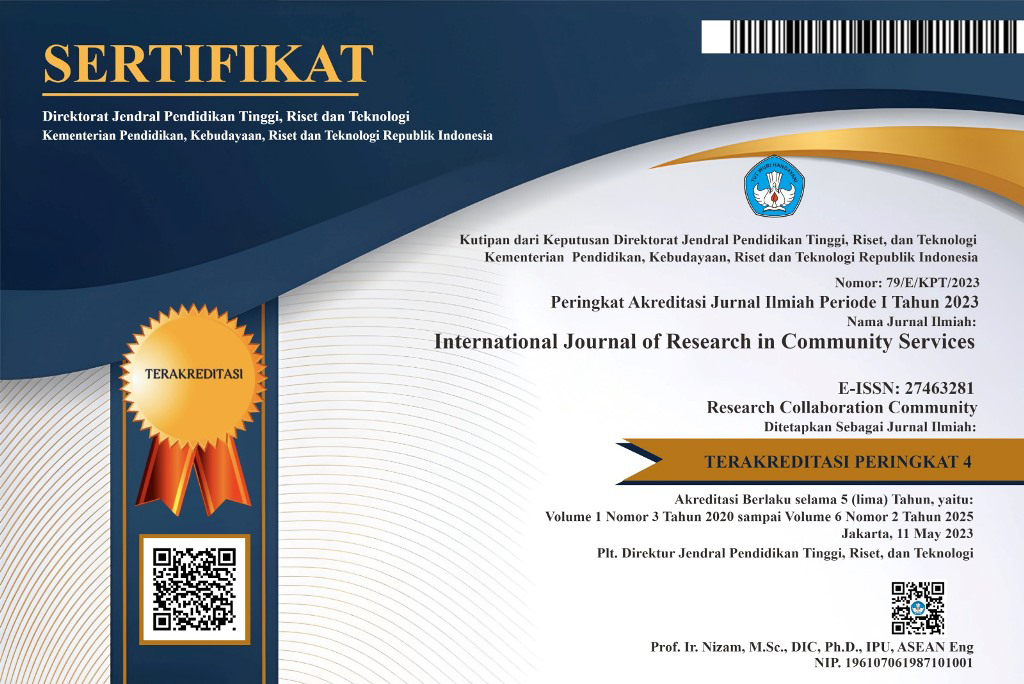Development of Drama using Heuristic Method for MTs Mutiara Ilmu, North Sumatra, Indonesia
Abstract
The purpose of this study was to describe the design validation of the development of legend-based drama teaching materials using the heuristic method for class VII students of MTs Mutiara Ilmu, North Sumatra, Indonesia. The research method used in this research is the research & development method. The subject of research on product development in this study is the validator. In addition, the subjects of this study were seventh grade students of MTs Mutiara Sains. The results of this study indicate that the design of developing legend-based drama teaching materials using the heuristic method for class VII students of MTs Mutiara Sains, starts from information related to students' descriptions in the implementation of learning in class, it is known that learning has been carried out well. However, students' responses to the material and evaluation of learning are still low. Based on the collection of information obtained, it was found that it was necessary to develop legend-based drama teaching materials using the heuristic method. The results of expert validation on the design of developing legend-based drama teaching materials using the heuristic method obtained an average validation score of 4 with good categories. Thus, it can be concluded that the legend-based drama teaching materials using the heuristic method are suitable for use by class VII students of MTs Mutiara Sains.
Keywords
Full Text:
PDFReferences
Angelianawati, L. (2019). Using Drama in EFL Classroom. Journal of English Teaching, 5(2), 125-134.
Bangun, E. Y. B. (2021). Pawang Ternalem Drama Text as a Material Indonesian Language in Grade VIII of Junior High School. Britain International of Linguistics Arts and Education (BIoLAE) Journal, 3(1), 10-21.
Baykal, N., Sayin, I., & Zeybek, G. (2019). The Views of ELT Pre-Service Teachers on Using Drama in Teaching English and on Their Practices Involved in Drama Course. International Journal of Contemporary Educational Research, 6(2), 366-380.
Goyón, C., & Fernanda, M. (2022). Drama as a methodological strategy to develop speaking skills (Master's thesis, La Libertad: Universidad Estatal Península de Santa Elena, 2022).
Gultom, Y., Ambarita, B., & Daulay, S. (2019). The Development of Authentic Assessment Instruments on Drama Text Learning for Students of Class VIII in Junior High School 6 Tebing Tinggi. Budapest International Research and Critics in Linguistics and Education (BirLE) Journal, 2(3), 312-332.
Indayarsi, Y. (2019). The Improvement of Drama Writing Skill of Grade VIII Students at Junior High School. SPEKTRUM: Jurnal Pendidikan Luar Sekolah (PLS), 7(2), 157-162.
Liyanawatta, M., Yang, S. H., Liu, Y. T., Zhuang, Y., & Chen, G. D. (2022). Audience participation digital drama‐based learning activities for situational learning in the classroom. British Journal of Educational Technology, 53(1), 189-206.
Nguyen, H. M. P. (2021, March). The Use of Drama Role-Playing in Teaching English Literature for English Majored Students: An Action Research at Van Lang University. In 17th International Conference of the Asia Association of Computer-Assisted Language Learning (AsiaCALL 2021) (pp. 303-307). Atlantis Press.
Nurhasanah, E. (2022). How does Learning Drama Help Students to Build Seven Survival Skills?. Budapest International Research and Critics Institute (BIRCI-Journal): Humanities and Social Sciences, 5(1), 7184-7194.
Peter, M. (2003). Drama, narrative and early learning. British Journal of special education, 30(1), 21-27.
Schenker, T. (2020). Fostering foreign language skills through an extracurricular drama project. The Language Learning Journal, 48(6), 785-798.
Sirisrimangkorn, L. (2018). The use of project-based learning focusing on drama to promote speaking skills of EFL learners. Advances in Language and Literary Studies, 9(6), 14-20.
Sunaryo, H. (2020, October). Learning Democracy in Learning the Skill of Playing Drama Characters. In International Conference on Community Development (ICCD 2020) (pp. 291-294). Atlantis Press.
Taib, S. A., Sa’adan, N., Saidalvi, A., Nurmaisarah, S., Fkhururazi, A. A., & Jenal, N. (2022). Investigating The Effects of Radio Drama Activity in ESL Learning on Male and Female Students. International Journal of Academic Research in Business and Social Sciences, 12(4), 817-833.
Tifani, K., Anjasmara, H., & Hidayat, H. (2021, March). The Development of Teaching Materials Drama for Students Class Viii Junior High School (Structural Approach Based Development Research). In UNISET 2020: Proceedings of the 1st Universitas Kuningan International Conference on Social Science, Environment and Technology, UNiSET 2020, 12 December 2020, Kuningan, West Java, Indonesia (p. 318). European Alliance for Innovation.
Uysal, N. D., & Yavuz, F. (2018). Language learning through drama. International Journal of Learning and Teaching, 10(4), 376-380.
Winston, J. (2022). Participatory drama: A pedagogy for integrating language learning and moral development. Beijing International Review of Education, 3(4), 591-605.
Wongsa, M., & Son, J. B. (2022). Enhancing Thai secondary school students’ English speaking skills, attitudes and motivation with drama-based activities and Facebook. Innovation in Language Learning and Teaching, 16(1), 41-52
DOI: https://doi.org/10.46336/ijrcs.v3i2.267
Refbacks
- There are currently no refbacks.
Copyright (c) 2022 International Journal of Research in Community Services

This work is licensed under a Creative Commons Attribution 4.0 International License.
Published By:
IJRCS: Jalan Riung Ampuh No. 3, Riung Bandung, Kota Bandung 40295, Jawa Barat, Indonesia
Indexed By:

This work is licensed under a Creative Commons Attribution 4.0 International License.
View My Stats








